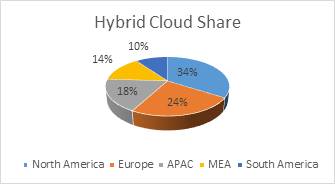Digital transformation drove the companies to move their data to the cloud. In the early days, cloud platforms used to offer two types of cloud, namely public cloud and private cloud.
Though, some of the companies were reluctant to move their entire data to the public cloud due to data privacy concerns. But the features of the public cloud were far greater than the private cloud.
To solve this problem, most of the companies started using the “Hybrid Cloud” platforms. Hybrid cloud is the combination of the private and the public cloud. It allows you to access the best of both worlds.
Recently, many of the companies have made a switch to the hybrid cloud, and we believe this trend will continue for the foreseeable future. We will be looking at some of the hybrid cloud trends to look out for in 2020.
Hybrid Cloud Trends, Market Size, and Facts from 2020
The below-mentioned facts are according to the Forrester Report:
- Some companies have opted for a hybrid cloud solution by accident. It is because of the rush to move to the cloud. And in that rush, they are still using some infrastructure-based data, and some data is moved to the cloud. This term is known as hybrid-by-accident.
- Companies are opting for a hybrid-by-design strategy (i.e., after meticulous planning), are still facing some hurdles in the ideal implementation of a hybrid cloud.
- As most of the hybrid cloud platforms integrate well with the local IT infrastructure and private cloud platforms, companies can easily split the apps into two parts. One, at the private cloud/local infra, and second at the public cloud platform.
- Big companies are moving to the hybrid cloud and even small companies are taking to it due to its availability and scalability.
- Invisible cloud and invisible management are strongly coming to the main fore in hybrid cloud management.
- The vendor lock-in period still remains a big worry for many hybrid cloud vendors.
- Companies are changing the way they implement the connected tools technology in 2020.
- The ongoing COVID-19 pandemic has forced most companies to ask their employees to work remotely (WFH). And hence they have made a move to the cloud, and the hybrid cloud seems to be the preferred choice for them. The hybrid cloud offers more flexibility and more protection to their intellectual property.
The hybrid cloud is growing by every day, and we will be looking at the market share of hybrid cloud region-wise.
According to TechSciResearch, North America is a dominant region in the hybrid cloud market share as expected.
It is followed by Europe and then by Asia Pacific (APAC). Then comes MEA (the Middle East and Africa). South America has the least market share as per the report.
Most of the respondents for this survey were the decision-makers of their respective companies, so we can assume that this report is in line with the actual scenario.
- According to Logic Monitor, almost 22% of businesses will be running on the hybrid cloud by 2020.
- According to the IBM Hybrid Cloud Report for Banking, top banks are 88% more likely to implement hybrid cloud than the small ones.
- According to a Red-hat survey, cloud-native apps are going to be the most trending factor in the hybrid cloud deployment in 2020.
- According to another survey by Allcloud, 27.6% of companies are opting for hybrid cloud platforms because of enhanced security measurements. The reliability of hybrid cloud comes as a second major factor behind choosing hybrid clouds in 2020.
- More and more companies are opting for automated technology platforms. Ease of integration with these platforms is one of the key reasons companies choose a hybrid cloud option in 2020.
Future Scope:
We can see that most of the business leaders are moving to the hybrid cloud in the digital future. And with the current global scenario, the majority of the companies will be shifting to the hybrid cloud.






